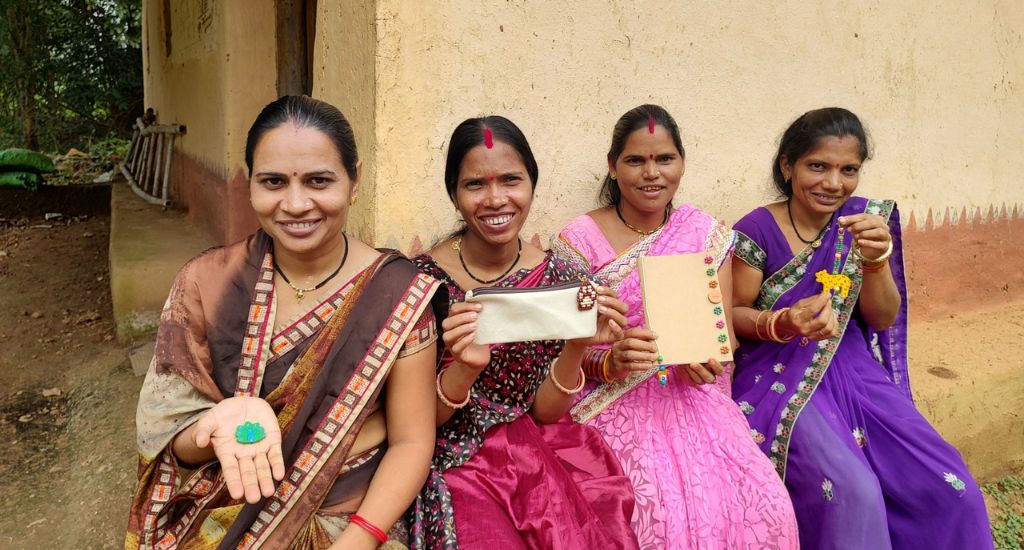
Travel souvenirs take MP artisans on road to success
Pashoo Pakshee, a social enterprise founded by Savini Sonavaria, supports over 350 artisans producing nature-inspired souvenirs, provides fair wages and financial independence.

Pashoo Pakshee, a social enterprise founded by Savini Sonavaria, supports over 350 artisans producing nature-inspired souvenirs, provides fair wages and financial independence.
A young woman named Sulochana has become the talk of her community in the remote village of Khamreeth, near Pench National Park in Madhya Pradesh. At 25, she achieved a rare milestone, becoming the first woman in her village to own a scooter. Her accomplishment was not just a personal triumph. It reflected the transformative power of social enterprise.
Sulochana’s path to this achievement began when she started working with Pashoo Pakshee, a social enterprise founded by Savini Sonavaria, an alumnus of BITS Pilani, in 2016.

Sonavaria’s vision was both simple and profound: to create nature-inspired souvenirs crafted by local communities living near India’s national parks and wildlife sanctuaries. This idea emerged from her visits to these areas, where she noticed a disconnect. Despite the abundance of wildlife and natural beauty, the souvenir shops were stocked with products made in cities like Mumbai and New Delhi or even imported from China, leaving no room for local craftsmanship.
“In 2013, while completing my master’s in engineering, I did a cross-functional thesis with the Nature Conservation Foundation on bird call recognition. During this project, I interacted with many conservation scientists and researchers, learning about the pressing issue of man-animal conflict and the need to provide alternative livelihoods to communities living near wildlife. That’s when I thought, why can’t these communities make souvenirs for the tourists visiting the parks?” Sonavaria said.
In 2016, Sonavaria left her corporate job to become a full-time social entrepreneur. She aimed to create a range of nature-themed souvenirs crafted by local artisans, providing them with a source of income and encouraging the preservation of local wildlife and culture.
Also Read: MP artisans ‘wax’ eloquent through batik
Today, Pashoo Pakshee works directly with more than 100 artisans and indirectly with another 250 across central India. Despite challenges, from understanding market demands to balancing seasonal priorities, the enterprise has grown steadily, even weathering the storm of the Covid-19 pandemic.
Sonavaria recalled the early days of motivating artisans to meet market demands. Many artisans, living in remote areas, were unfamiliar with quality standards and delivery timelines. Convincing them to prioritise this work alongside their traditional livelihoods was a major hurdle.

“Working with communities is hard work. Assuming things are going well and taking a step back is never an option. We have to keep motivating, retraining, and staying connected to ensure the products reach the highest quality. Being a bootstrapped organisation, our growth has been tough and slow. But there is growth, both financially and socially, and that’s what keeps us going,” Sonavaria said.
Through continuous training, feedback and support, the artisans began to understand the value of their work. During the pandemic, when tourism halted, Pashoo Pakshee survived and emerged stronger, recording its first profits in the past two years, with current sales reaching Rs 1.2 crore.
Pashoo Pakshee offers a wide range of products, from T-shirts and caps to fridge magnets, bags and stationery, with prices ranging from Rs 100 to Rs 1,500. This inclusive pricing strategy ensures that every type of tourist can take home a piece of handmade artistry. The enterprise operates on a 50 percent profit-sharing model with community centres, ensuring fair compensation for the artisans. This model has provided a stable income for the artisans, empowering them to improve their lives drastically.
Also Read: SFURTI: Helping farmers to become artisans with a novel scheme
The true impact of Pashoo Pakshee is best seen through the personal stories of its artisans. Sulochana’s story is just one among many. Her income from working with Pashoo Pakshee allowed her to buy a scooter. More importantly, it gave her the financial independence to delay marriage, a significant decision in her community where girls typically get married by the age of 21 or 22 years.

Another inspiring story is that of Indrakala Patel from the Kanha centre. As the sole earning member of her family, her work with Pashoo Pakshee has transformed their lives. With a steady income of around Rs 8,000 a month, she has moved her children to a better school, ensuring a brighter future for them.
Pashoo Pakshee’s team includes three in-house designers who work on new designs during the monsoon season when tourism slows down. Customer feedback plays a crucial role in this process, helping the team understand what works and what needs improvement.
“We introduce simple technology interventions to get the products to market-worthy standards. Today, if you see the products made by our first two centres in Pench and Kanha, it’s hard to believe they were made by a group of women in such remote locations,” Sonavaria said.
The enterprise currently operates four main units: Khamreeth Toy & Paper Mache Centre in Pench, Baherakhar Stitching & Beading Centre in Kanha, Madla Stitching & Screen Printing Centre, and Dhamna Terracotta Centre in Panna. The Madhya Pradesh Tourism Board has also recognised their work, selling Pashoo Pakshee products at state tourism hotels in Khajuraho, Panna, Kanha, Bandhavgarh and Pachmarhi.
Also Read: It’s time to explore new possibilities in village enterprises

Through continuous effort and dedication, Sonavaria and her team have created a sustainable model that empowers local communities, preserves their cultural heritage, and provides tourists with unique, authentic souvenirs in Madhya Pradesh.
The lead image on top features women artisans displaying a diverse range of products, including T-shirts, caps, fridge magnets, bags, and stationery. (Photo courtesy Pashoo Pakshee)
Unnati Sharma is a journalist, writer, and translator. She has worked with ThePrint as a Senior Correspondent specialising in politics, in-depth features, and art and culture stories.